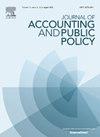税收法规与企业社会责任:来自修订法规采用的证据
IF 2.2
3区 管理学
Q1 BUSINESS, FINANCE
引用次数: 0
摘要
为了堵住避税漏洞,美国各州曾在不同时期制定过“回溯法”(addback laws),这大大减少了总部设在采纳州的公司的税后收入。利用这些法规作为应税收入的外生冲击,我们研究了税收法规的变化如何影响企业的企业社会责任(CSR)绩效。使用差异中的差异方法,我们发现,在受修订法规约束的州,公司的企业社会责任绩效得分显著下降。在横断面分析中,我们进一步表明,这种关联在具有高水平无形资产的公司中更为明显,例如成长型公司、研发支出巨大的公司和拥有大量专利的公司,以及具有高投资机会和财务约束的公司,这些公司更有可能受到回修法规的影响。此外,显著影响在企业社会责任优势和关注方面都很明显,跨越了大多数维度,并且在不同的环境、社会和治理(ESG)指标提供者之间是一致的。总体而言,这些发现具有重要的政策意义:它们突出了税收法规的意外后果,并强化了税收带来的财政负担增加可能限制CSR/ESG投资可用资本的观念。本文章由计算机程序翻译,如有差异,请以英文原文为准。
Tax regulations and corporate social responsibility: Evidence from the adoption of addback statutes
Different U.S. states have enacted addback statutes at various times to close tax avoidance loopholes, significantly reducing the after-tax income of companies headquartered in adopting states. Leveraging these statutes as exogenous shocks to taxable income, we investigate how changes in tax regulations affect firms’ corporate social responsibility (CSR) performance. Using a difference-in-differences approach, we find that firms in states subject to addback statutes experience a significant decline in their CSR performance scores. In cross-sectional analyses, we further show that this association is more pronounced among firms with high levels of intangibles—such as growth firms, those with significant R&D spending, and firms with a high number of patents—as well as among firms with high investment opportunities and financial constraints, which are more likely to be affected by the addback statutes. Moreover, the significant effect is evident across both CSR strengths and concerns, spans most dimensions, and is consistent across different providers of environmental, social, and governance (ESG) indicators. Overall, these findings carry important policy implications: they highlight an unintended consequence of tax regulations and reinforce the notion that increased financial burdens from taxes can limit the capital available for CSR/ESG investments.
求助全文
通过发布文献求助,成功后即可免费获取论文全文。
去求助
来源期刊

Journal of Accounting and Public Policy
Multiple-
CiteScore
4.80
自引率
2.80%
发文量
75
期刊介绍:
The Journal of Accounting and Public Policy publishes research papers focusing on the intersection between accounting and public policy. Preference is given to papers illuminating through theoretical or empirical analysis, the effects of accounting on public policy and vice-versa. Subjects treated in this journal include the interface of accounting with economics, political science, sociology, or law. The Journal includes a section entitled Accounting Letters. This section publishes short research articles that should not exceed approximately 3,000 words. The objective of this section is to facilitate the rapid dissemination of important accounting research. Accordingly, articles submitted to this section will be reviewed within fours weeks of receipt, revisions will be limited to one, and publication will occur within four months of acceptance.
 求助内容:
求助内容: 应助结果提醒方式:
应助结果提醒方式:


